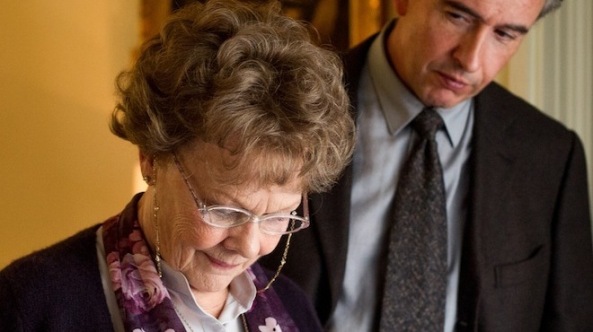“Philomena” screened as a part of the Chicago International Film Festival. This early review is merely an impression of the version screened.
What makes a great story? Most people think it’s just a good plot; juicy twists and surprises are all it takes. “Philomena” and the real life story behind Martin Sixsmith’s book is filled with teen pregnancies, evil nuns, gay Republicans, death, reunion, comedy and religion; it’s got it all.
But Stephen Frears’s film muddles the characters, the ideas and the storytelling style that would help make it great. It’s a mess of tones and loosely fleshed out philosophies on faith and forgiveness that keeps “Philomena” from working as either a detective thriller or as a journalistic investigation.
Sixsmith (Steve Coogan) was a BBC News broadcaster forced out of a job after a scandalous quote about burying the news was wrongly attributed to him. Looking for work, he decides to take a human interest piece centered on the elderly Philomena Lee (Judi Dench).
Lee spent her teenage years living in a convent, and after accidentally becoming impregnated, the nuns made her atone for her sins by giving away her son to an American family when he was just a toddler, forbidding her to search for her son or reveal she even had one.
Sixsmith isn’t so much moved by her story or by Lee as he is intrigued that it’ll make for juicy copy. He takes Lee to Washington D.C. to search for her son, only to dig up a conspiracy surrounding how little they can discover.
It’s actually a complex story, and the screenplay by Coogan and Jeff Pope should be applauded for making it appear simple and crowd-pleasing. And yet its nuance is found in the awkward relationship between Sixsmith and Lee, she a simple old white lady who doesn’t fully grasp Sixsmith’s sarcasm, likes the movie “Big Mamma’s House” and disapproves of his cynical tendencies.
The difficulty with Lee’s character however is that for as much as we’re made to laugh at her socially awkward quirks, for instance saying borderline racist slurs with a smile to a Mexican chef at their hotel’s omelet bar, we’re supposed to take her faith and her misfortune with solemnity. Sixsmith is written as the practical and agnostic sounding board, but his role is either underwritten or nullified by how much Christian pandering it does.
Many will praise Judi Dench’s haphazard combination of comedy and melodrama, but she’s doing little more than what she does best, and Frears reduces her performance to shots of her eyes glossing over as the movie drifts off into a fantasy.
“Philomena” is so obsessed with its own nostalgia; lights flood through the room and carry the audience to a precious film reel of home movies. When it’s trying to be serious, it needlessly reminds us of the thoughts that must be running through Lee’s mind as she revisits the convent. It’s tear jerking flashback footage that appears all too often.
“Philomena” strikes me as a great story, and it’s told lightly enough that it will be a sure-fire crowd pleaser. But Frears has turned Sixsmith’s book into a morality tale of faith, religion, goodness and decency that it doesn’t earn.
2 ½ stars
